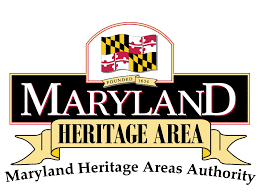 Chesapeake Crossroads Heritage Area joins the Moore Administration in announcing 8 new grants totaling $426,716 to local Annapolis and Anne Arundel County non-profit organizations by the Maryland Heritage Areas Authority (MHAA). The 8 local grants awarded are among 91 matching grant awards totaling $4.6 million for Maryland nonprofits, local jurisdictions, and heritage tourism organizations by the Maryland Heritage Areas Authority. Grant funding will support heritage tourism projects and activities and expand economic development and tourism-related jobs across Maryland.
Chesapeake Crossroads Heritage Area joins the Moore Administration in announcing 8 new grants totaling $426,716 to local Annapolis and Anne Arundel County non-profit organizations by the Maryland Heritage Areas Authority (MHAA). The 8 local grants awarded are among 91 matching grant awards totaling $4.6 million for Maryland nonprofits, local jurisdictions, and heritage tourism organizations by the Maryland Heritage Areas Authority. Grant funding will support heritage tourism projects and activities and expand economic development and tourism-related jobs across Maryland.
“History is an active force for promoting economic development and building strength in our communities,” said Gov. Moore. “Projects funded through our Heritage Grant Awards will make Maryland more competitive, support a diverse array of new partnerships, and enrich the lives of thousands of people.”
The Maryland Heritage Areas Program provides $2.4 billion in annual economic impact. Maryland Heritage Areas Authority grants generate $319.8 million in state and local taxes and supports 33,815 full- and part-time jobs annually. Organizations receiving grant awards include museums, parks, historic sites, educational organizations, and other entities that steward and celebrate the unique cultural and natural resources located within one of Maryland’s 13 certified heritage areas, a program that is locally administered and overseen by the authority.
Project grants funded by MHAA in the Chesapeake Crossroads Heritage Area for FY2026 include:
- Chesapeake Children’s Museum, Inc.: Building Renovations ( $100,000)
- Historic Annapolis, Inc.: Welcome Center Construction At 1 Martin Street ($40,116)
- Severn Improvement Association, Inc.: Historic Community at a Crossroads: A Feasibility Study for the Queenstown Heritage Center ($50,000)
- Skipjack Heritage, Inc.: Skipjack Heritage Days at Sandy Point ($36,600) and
- St. John’s College/Mitchell Art Museum: The Liberty Tree Project ($50,000.)
Three of the grant recipients are first-time applicants to the program which highlights the support this funding offers to develop and launch new and innovative heritage tourism experiences across the Chesapeake Crossroads. One of those first time recipients was the Elizabeth Myers Mitchell Art Museum at St. John’s College for the “Liberty Tree Project.” Peter Nesbett, the museum’s director, said, “the grant will be truly transformation for this timely project, which brings together different local communities with an incredible artist to talk about liberty today. What does freedom look like to people who feel unfree?”
In addition, the Chesapeake Crossroads Heritage Area received funding for its FY2026 Management Grant ($100,000), a FY2026 Block Grant that funds partner organizations through for its Mini-Grant program ($25,000), and a FY2026 Marketing Grant to elevate and promote the celebration of our nation’s semiquincentennial — the 250th in the coming year ($25,000). Together, the heritage area organizations received a total of $$426,716 in State grant awards from this important heritage-related grant fund.
“The Maryland Heritage Areas Program demonstrates how history, culture, recreation and planning can work together to protect and share state assets and regional identities,” said Maryland Department of Planning Secretary and Maryland Heritage Areas Authority Chair Rebecca L. Flora. “I am particularly excited to see that several projects being awarded this year are connected to honoring Maryland’s role in the nation’s upcoming semiquincentennial. I continue to be in awe of the grantee organizations that dedicate so much time and passion to make sure the full range of our state’s diverse stories are being told in authentic and engaging ways. Their efforts create experiences that enhance quality of life, make our towns more livable, and contribute to local economies.”
From Maryland’s Atlantic and Chesapeake Bay coastal areas to the unspoiled scenery of Maryland’s mountains, Maryland’s heritage areas contribute to the state’s economy by preserving and enhancing the places that attract local and out-of-state tourists. Heritage areas foster broad public-private partnerships to preserve and enhance Maryland’s historic sites and towns, unspoiled natural landscapes, diverse stories, and enduring traditions. All Maryland counties and Baltimore City have at least part of a state-certified heritage area within their boundaries.
The Maryland Heritage Areas Authority is an independent unit of government chaired by the Maryland Department of Planning Secretary Rebecca Flora and is administered by the Maryland Historical Trust. A full economic impact study can be found at https://mht.maryland.gov/Documents/MHAA/MHAA%20program%20impact.pdf.
To learn more about the Maryland Heritage Areas Program and the state’s certified heritage areas, please visit https://mht.maryland.gov/Pages/MHAA/heritage-areas.aspx
